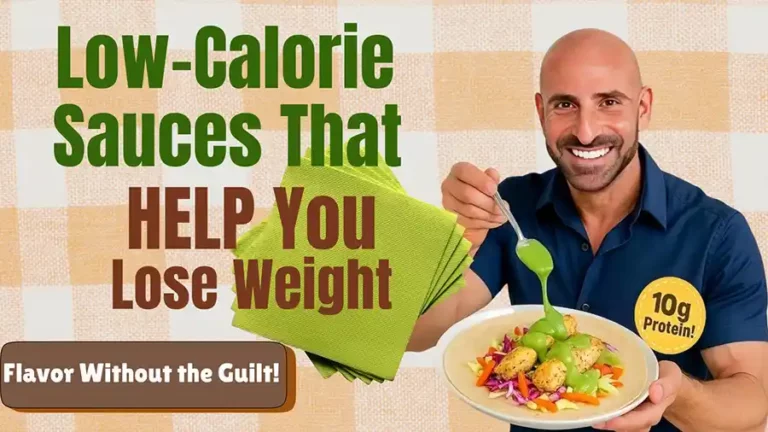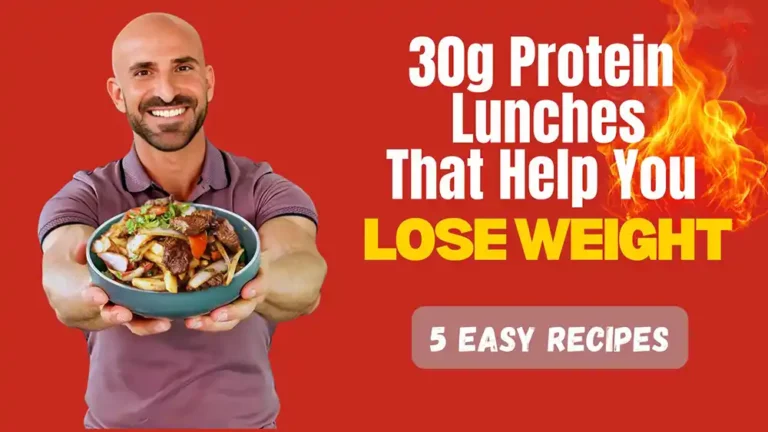Are you wondering how to lose weight without exercise? It is possible, so here are the key things to pay attention to for weight loss success and maintenance.
As a registered dietitian with over 20 years of experience in nutrition and weight management, I understand that life gets busy, and sometimes exercise just isn’t an option. This isn’t to say that exercise doesn’t have its health benefits, but that’s a conversation for another day.
I’ll walk you through simple, effective strategies like mindful eating, portion control, and smart food choices that will help you drop those extra pounds. You’ll learn how to create a calorie deficit, choose foods that keep you full, and make small changes in your daily routine that add up big. These are strategies I’ve seen work for thousands of clients. Let’s get started on your weight loss journey—right here, right now!
1. Calorie Deficit: The Key to Weight Loss
First things first, losing weight comes down to a simple concept: a calorie deficit. Simply put, it means eating fewer calories than your body burns throughout the day. Trust me I know it’s not all about calories in and calories out. Losing weight is complex and multifactorial.
Exercise is great for burning calories; strength training can help maintain muscle mass as you lose weight. But diet plays an even bigger role. It’s easier to control your calorie intake by making smart food choices than by relying on exercise alone. This is why I always say, 80% is what you eat and the effort you put in to make sure you have healthy, meals. The other 20% is exercise.
2. Protein, Your Weight Loss Ally
This wouldn’t be a weight loss conversation without talking about protein. High-protein foods can help you feel fuller longer, help control your hunger hormones, and preserve lean muscle mass as you lose weight. Foods like eggs, fish, legumes, and even cottage cheese are excellent sources.
I recommend including protein in every main meal and the afternoon snack. Wondering how much is the right amount for you? I have a whole article on how much protein to eat to lose weight and timing throughout the day.
3. Portion Control and Mindful Eating
One of the best ways to manage calorie intake without feeling deprived is through portion control. Even healthy foods can lead to weight gain if you eat too much. A simple strategy is to use smaller plates and measure your portions.
Practice mindful eating—this means slowing down, savoring each bite, and paying attention to when you’re full. Put your phone away and be present with your food.
4. Focus on Nutrient-Dense Foods
This means foods that give you a lot of nutrients for relatively few calories. Think vegetables, fruits, lean proteins, and whole grains. These foods nourish your body and help keep you full and satisfied longer, reducing the temptation to snack on less healthy options.
Also, these foods provide another key nutrient FIBER. Fiber makes you feel full, eat a lot fewer calories, and regulate your bowel movements. I had a client who lost 53 pounds by increasing her fiber and protein at every meal. Something she had never done.
5. Move More Throughout the Day
Even if you’re not exercising, I encourage you to move more throughout the day. This doesn’t mean hitting the gym—it could be as simple as counting your steps. Start by tracking your average daily steps, and then gradually increase that number.
If you start at 3,000 steps a day, aim for 5,000. The body benefits more from being active throughout the day than from just one short burst of exercise.
Here are a few examples:
- Get off at an early metro station so you can walk more.
- If applicable, walk home from work, or walk to the supermarket.
- Take the stairs: I remember another client worked on the 16th floor but he would go to the 9th floor with the elevator and walk up the stairs to the 16 floor.
Small walks or standing more often can have a big impact.
6. Stay Hydrated and Drink Healthy Beverages
Staying hydrated is crucial. Water helps with overall health and can prevent unnecessary snacking when thirst is mistaken for hunger. Your brain confuses thirst for hunger 60% of the time.
Plus, sugary drinks can add calories fast. Stick to water, herbal teas, unsweetened sparkling water, or other low-calorie beverages to stay on track.
7. Focus on Overall Lifestyle and Sleep
And don’t forget lifestyle factors. Lack of sleep can mess with your hunger hormones, leading to overeating, and stress often triggers emotional eating. Research shows that even acute sleep deprivation increased the hunger hormone ghrelin, and decreased satiety hormone leptin.
I always advise my clients to prioritize sleep and find stress-relief techniques that work for them, whether it’s mindfulness, meditation, or simply taking time to relax.
Next Steps for Your Weight Loss Journey
So, there you have it. Losing weight without exercise is all about making smart food choices, controlling portions, and moving more in your everyday life. If you’re looking for extra guidance, schedule a 20-minute free consultation for us to discuss how I can help you on your journey. Start small, be consistent, and these healthy habits will stick.
References:
- Kohanmoo A, Faghih S, Akhlaghi M. Effect of short- and long-term protein consumption on appetite and appetite-regulating gastrointestinal hormones, a systematic review and meta-analysis of randomized controlled trials. Physiol Behav. 2020;226:113123. doi:10.1016/j.physbeh.2020.113123
- van Egmond LT, Meth EMS, Engström J, et al. Effects of acute sleep loss on leptin, ghrelin, and adiponectin in adults with healthy weight and obesity: A laboratory study. Obesity (Silver Spring). 2023;31(3):635-641. doi:10.1002/oby.23616





